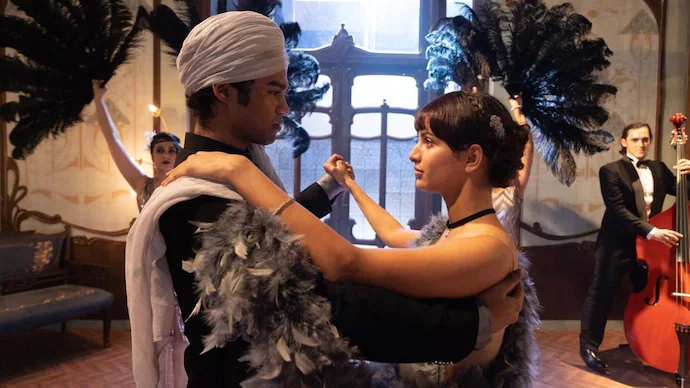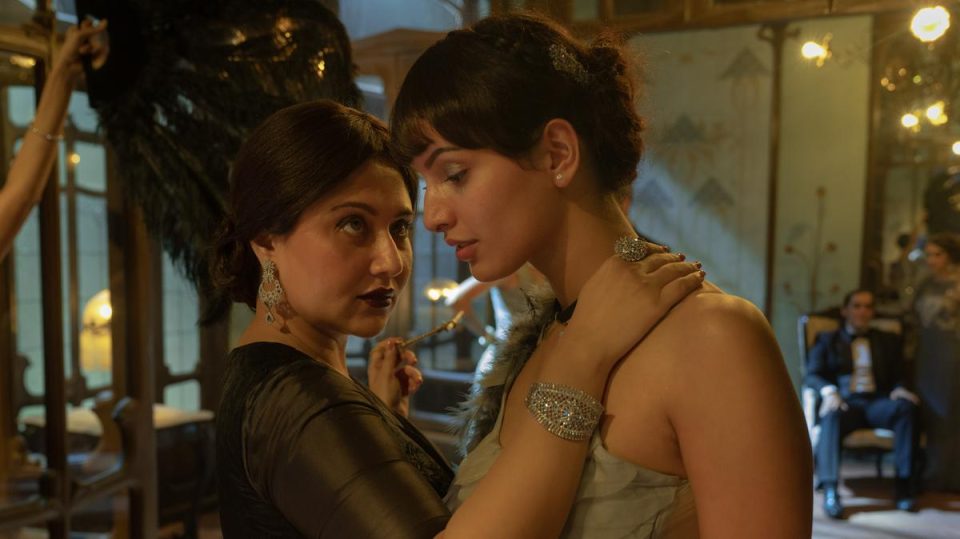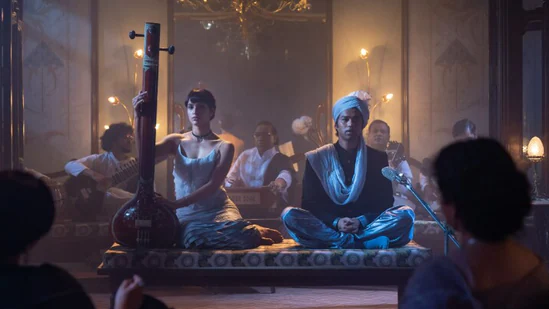
‘Qala’ review: A sensual mood piece, a strange little psychological puzzle

Anvita Dutt’s Qala is a strange beast of a film. It is at once a display of Dutt’s single-handed ability to conjure some of the most sensual visual imagery and sonic arrangements in Hindi film as well as a glaring evidence of her limitations as a screenwriter.
Like her debut film Bulbbul (2020), Dutt crafts Qala as a female-led psychological puzzle in which nearly every frame is steeped in poetry. But unlike the assured world-building of her debut film, Qala lacks a compelling narrative foundation.
It’s the reason much of the film’s commentary on female survival and trauma feels derivative — there is, after all, nothing more underwhelming than a film that pretends to say everything while saying nothing at all.
Mother-daughter dyad
Set in the early 1940s in the backdrop of Indian classical and Hindi playback music, Qala tells the story of its eponymous young heroine (Triptii Dimri) and her traumatic relationship with her distant mother Urmila (Swastika Mukherjee).
Also read: Review: Alphonse Puthren’s Gold shines, but loses its sheen in climax
The film opens in the present day — Qala, a talented singer at the prime of her Hindi film career, has just been honoured with a golden vinyl, an acknowledgement of the unrivaled indispensability of her voice. But not everything is as rosy as it looks.

For one, her musician mother resents her, continuing to hold Qala responsible for the deaths of her twin brother as well as Jagan (Babil Khan in his debut), the orphaned folk singer she preferred over her daughter’s singing talents. Not only does Qala come across as repressed but the young woman also seems to always be on edge, as if she’s one step away from being discovered as an imposter.
Descent into madness
Intercutting between past and present timelines (one set in pre-independent Calcutta and the other, in snow-clad Himachal Pradesh), Dutt reveals the tragic undercurrents of Qala’s past life that have led her to a present where she rapidly descends into madness.
Working with her Bulbbul cinematographer Siddharth Diwan and production designer Meenal Agarwal, Dutt composes frames that resemble a painting. The attention to detail in the film’s production design is immaculate, revealing and withholding information and emotion poetically. The colour palette — whether it is the warm tones of a Calcutta night or the green walls that reflect Qala’s perpetual state of envy — and atmospheric lighting exist to serve Qala’s inner turmoil.
But there’s nothing that quite justifies the dreaminess of her disorientation like the film’s soundtrack, easily among the year’s best. Working with Amit Trivedi (arguably the composer’s best soundtrack outside of an Anurag Kashyap collaboration), Dutt rounds up a murderer’s row of musical collaborators who operate at the peak of their capabilities to lend the film its distinctive old-world shimmery charm.
Dangers of artistic rivalry
Given that the dangers of artistic rivalry forms the crux of Qala, it’s convenient to point at the similarities between the film’s ambitions and Darren Aronofsky’s Black Swan (2010). In fact, the filmmaker directs a couple of hallucinatory setpieces that feel like a direct nod to Aronofsky. I’d argue that comparison isn’t entirely an affront considering Dutt and Diwan succeed in infusing their stylistic sensibilities in these sequences that give Qala a life of its own.
Also read: ‘Bhediya’ review: No hour of the werewolf — A roar that’s more of a whimper
Still, Qala is more fascinating when it remains concerned with examining the abusive power dynamics of caregiving and the restricted agencies of women in pre-independent India. To that end, Dutt borrows heavily from the visual language of both Lynne Ramsay’s We Need To Talk About Kevin (2011) and Jean-Marc Vallée’s Sharp Objects (2018) to give the film its moody texture.
In that, Qala’s strongest moments are built on Dutt’s keen eye for micro-aggressions: a startling scene in which Urmila gestures at Qala to stop singing, letting her daughter realize the embarrassment her voice causes her feels like a punch-in-the-gut. As does a predatory sequence that reflects the language of submissiveness Qala inherits from her mother. Or the irony of Qala’s predator composing her breakout song that centers around a heroine (producer Anushka Sharma’s cameo is a sweet touch) crooning about consent.
It helps that both Dimri and Mukherjee’s body language bristle with a suppressed rage, translating into an essential visual blueprint of the ways in which women love and punish their own.
A portrait of female fragility
I only wish the ferocity of Dutt’s gaze crept into the film’s politics, which wants to be provocative but occasionally eschews from taking bold screenwriting choices. Not one of the characters, especially Qala and Urmila, feel fully etched. Everyone is depicted in binaries — a queer Muslim music composer (Varun Grover) is compassionate; a sexual predator (Amit Sial) is shrewd; a musical outsider (Khan) is naive. Even the way Urmila’s single-minded indifference toward Qala is written feels one-note and stagey. Perhaps that’s why a last-minute change of heart rings so false.
Still, Dutt reserves the biggest disservice for Qala, written simply as someone who keeps demanding sympathy instead of earning it. On more than one occasion, I wondered why the filmmaker seemed so insistent on victimizing her heroine even in scenes when Qala indulges her darkest impulses. In doing so, Dutt doesn’t exactly allow Qala much personality, reducing her to a caricature of a damsel-in-distress on paper.
Granted, Dimri turns in a committed, physically alert portrait of female fragility that elevates the written material — just look out for the sequence in which Dimri promptly rescues herself from the brink of a breakdown for proof. But I’d be lying if I said I couldn’t stop wishing for a film in which Dutt wasn’t so protective about painting her heroine a certain way and instead enabled the gifted actress to let loose.
Underlining the obvious
Like Dimri, Khan proves to be a revelation despite the underwritten part. His pained face is a thing of beauty and wonder. I must admit that the casting is ingenious: Dimri — a rank Bollywood outsider — essaying a legacy artist, and Khan — son of the late Irrfan Khan — playing an outsider could have come across as a gimmick had it been in the hands of lesser actors. But Qala massively gains from this role-reversal. It’s similarly heartening to see Mukherjee, a misunderstood actor in Bengali cinema, finally get the screentime that is so deserving of her gravitas.
Also read: ‘Black Panther: Wakanda Forever’ review: Heartfelt ode to a Marvel hero
I wish I could say that these countless touches were enough to completely overshadow the empty writing. Much of it stems from the fact that Dutt’s commentary on female survival builds on themes that she had already explored with greater clarity in Bulbbul. At times, Qala’s politics feels content in underlining the obvious (women get ahead at a great personal cost or that women can at times be the worst enablers of patriarchy) without actually examining any line of thinking that challenges that assumption.
For instance, Dutt’s stance on Qala’s marginalization makes no note of the familial privilege that’s also within her reach. The narrative conservativeness sits at odds with the ambitious metaphors and atmospheric flourishes that Dutt and her collaborators bring to Qala. Like I said, it’s a strange film. By that, I don’t mean to say that Qala doesn’t work — just that the film works under certain conditions.
Qala is currently streaming on Netflix.


